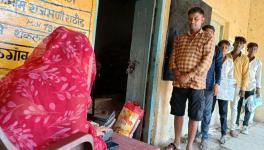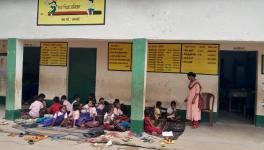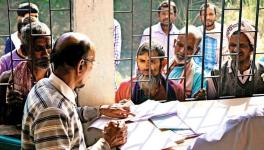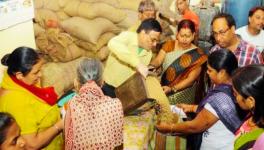Malnutrition Plagues Jharkhand, 22 Starvation Deaths in 5 Years
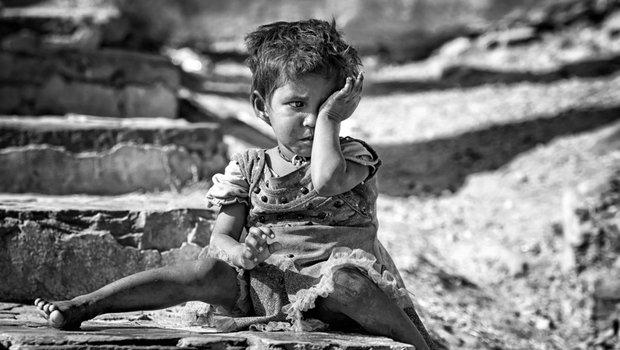
Image for representational use only.Image Courtesy : The Telegraph
In the last five years, at least 86 people have starved to death across the country, out of whom 22 people were residents of Jharkhand. The number of incidents was the highest in the year 2018, when the state witnessed 11 starvation deaths. In 2019, at least four people have starved to death until now, according to Right to Food Campaign, India.
Talking to NewsClick, Siraj Dutta of the Right to Food Campaign said, “All of the victims of starvation in Jharkhand were either adivasis, dalits, or people belonging to other backward sections of the society. Most of these families had a history of acute undernutrition, and being denied the ration entitlement played a key role in a large number of these deaths.”
He added, “Aadhaar was responsible for at least 13 of the 22 starvation deaths in the state, as the victims either did not have Aadhaar cards or their cards were not linked to their ration cards. This led to the families of the victims being denied their Public Distribution System (PDS) entitlements. In several of the remaining nine cases, Aadhaar indirectly played a role.”
This happened despite Jharkhand Chief Minister Raghubar Das claiming that no one should be denied ration for not having linked Aadhaar with their ration cards. According to the Right to Food Campaign, even though there is no provision of PDS entitlement being denied to people for not having Aadhaar cards or not linking their ration cards with it, denial of ration by the shop owners was the biggest cause of starvation deaths across the country.
Jharkhand is one of the states with the highest prevalence of malnutrition among children and women in the country, according to the Comprehensive National Nutrition Survey (CNNS) 2016-2018, released by the Ministry of Health and Family Welfare (MoHFW) in October 2019. According to the survey, Jharkhand is the state with the highest prevalence of wasting among children under five years of age. It also has the highest proportion of underweight children in that age group.
The CNNS found that 36.2% of children under the age of five years in Jharkhand were stunted. The stunting was severe for 14.1% of the children in that age bracket in the state. This was 1.5 percentage points higher than the all India average of 34.7%. The proportion of severely stunted children across the country was 13.2%. For children between the age of 5-9 years, the prevalence of stunting was 24.9% in Jharkhand, against the country-wide average of 21.9%.
According to the survey, the proportion of under-five children who were wasted in Jharkhand was 29.1%, the highest in India, compared to the country-wide average of 17.3%. 6.4% of under-five children in the state were severely wasted, it pointed out. The proportion of underweight children in the state was also significantly higher than other states. 42.9% of children under the age of five years in Jharkhand were underweight, according to CNNS, while the proportion for all of India was 33.4%. 15.5% of children in the age group were severely underweight.
The prevalence of anaemia in the state was also much higher than other states in the country. Forty-three percent of children under the age of five years were anaemic. For all children in this age group across the country, this proportion was 40.3%. In the age group of 5-9 years, 34.4% of the children in Jharkhand were anaemic. Across India, this proportion was 23.5%, almost 11 percentage points higher than the proportion in the state. Among adolescents aged 10-19 years, the prevalence of anaemia in Jharkhand was 34%, against 28.4% across the country.
On analysing the cases of starvation deaths in the state in the last five years, the Right to Food Campaign found that the negligence by the state government played a key role in a majority of these deaths. The victims and their families did not receive the benefits they were entitled to because they could not procure Aadhaar cards or ration cards after applying multiple times, or were denied rations because their fingerprints could not be verified by the Aadhaar-based biometric authentication (ABBA) point-of-sale machines in the ration shops. In several cases, the victims did not receive their rations because illness stopped them from visiting the shops and completing the biometric verification, as per the data available with the Right to Food Campaign.
Also read: Jharkhand: People Continue to Die of Hunger, Officials in Denial Mode
Get the latest reports & analysis with people's perspective on Protests, movements & deep analytical videos, discussions of the current affairs in your Telegram app. Subscribe to NewsClick's Telegram channel & get Real-Time updates on stories, as they get published on our website.











